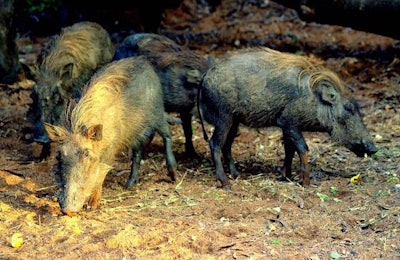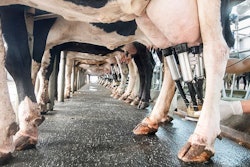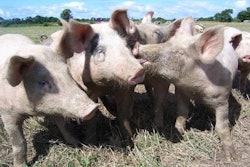
As ASF is confirmed in a third Nigerian state, the disease situation has also deteriorated in Papua New Guinea.
African swine fever (ASF) continues to cause “very high morbidity and mortality” among Nigeria’s pig population, according to the latest report to the World Organisation for Animal Health (OIE).
The agriculture ministry confirms that the ASF virus is in Ogun, the third state to be infected. The disease is suspected in two more states, with lab confirmation pending.
One week previously, cause of a sudden increase in pig illness and mortality rate that started in February was confirmed as ASF. Lab tests confirmed the presence of the ASF virus in the southern states of Lagos and Abia.
Now, pig farmers say ASF has spread to many parts of Nigeria, reports Naija 247 News.
Hundreds of thousands of pigs have already been culled. While ASF outbreaks have erupted periodically across Africa in recent years, farmers report the current situation is the worst so far.
Over recent years, pig farming has gained in popularity in Nigeria. The same source cites data from the national veterinary agency that put the country’s pig population at more than 7 million. In 1984, the figure was around 2 million.
Lack of accurate record-keeping by pig farmers had added to the challenges of controlling ASF. According to one veterinary researcher, ASF may have arrived in the country sometime last year.
Information from the OIE indicates that ASF has been present among domestic and wild pigs in Nigeria for many years.
Papua New Guinea takes new approach to ASF control
To bring ASF outbreaks in the Melanesian state of Papua New Guinea under control, the authorities have set up a special task force. According to Post-Courier, the group will be headed by the national agriculture and quarantine institution authority, NAQIA.
At the first meeting of the task force, members agreed that its first focus should be on raising awareness of the disease among pig farmers at a provincial level. Officers will be trained over the next six months on how to contact local pig farmers. The task force will also brief the minister about disease developments so that the government is informed about the situation.
In Papua New Guinea, the first cases of ASF occurred in March. Early outbreaks were in Hela and Enga provinces in the Southern Highlands. Despite every effort to control the movement of animals by the setting up of roadblocks, the infection has spread.
Initial funding for the task force has been supplied by the national and Australian governments.
Philippines hog raisers turn to poultry rearing
Farmers in the Philippines who have lost their pig herds to ASF are receiving support to switch to poultry production.
In the Ilocos region on the island of Luzon, around 20 former pig farmers have received 22 hens and two roosters, according to Philippine News Agency. They are also offered training on the care of their birds.
According to the latest report to the OIE from the Department of Agriculture, there have been no new cases of ASF on the island of Mindanao.
Since ASF first hit the region in January of this year, eight outbreaks involving more than 24,000 pigs have been reported to the OIE. Affected herds were in the provinces of Davao del Sur, Davao del Norte and Davao Oriental.
Pigs from backyard herds were culled and disposed of as part of the disease control response, reports the Department.
ASF confirmed in 5 more wild boar in South Korea
In the past week, South Korea’s agriculture ministry has confirmed to the OIE the deaths of a further five wild boar from ASF.
Four of these animals were found in Yeoncheon county in Gyeonggi province — where many infected boar have previously been confirmed. The fifth animal was from Pocheon county. Also in the northwestern border province of Gyeonggi, the first ASF case in Pocheon was detected earlier this year.
Approximately 640 cases of ASF in wild boar have so far been identified in South Korea, reports Yonhap. Almost all of those cases were found in the border area with North Korea.
The same source cites data from the drug safety agency that there have been fewer seizures of illegal meat products this year. They attribute this success to intensified efforts to prevent the import of potentially infected pork products from other countries.
View our continuing coverage of the global African swine fever situation.
















